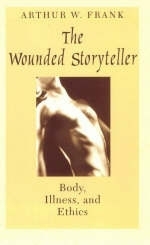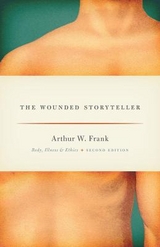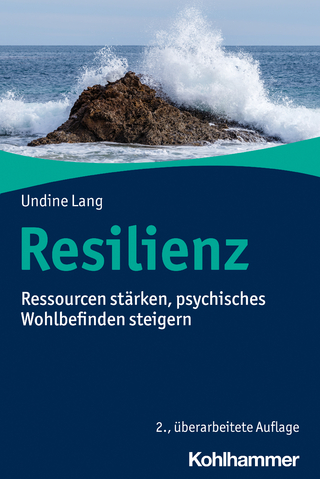
The Wounded Storyteller
Body, Illness and Ethics
Seiten
1997
|
New edition
University of Chicago Press (Verlag)
978-0-226-25993-2 (ISBN)
University of Chicago Press (Verlag)
978-0-226-25993-2 (ISBN)
- Titel erscheint in neuer Auflage
- Artikel merken
Zu diesem Artikel existiert eine Nachauflage
This work argues that people tell stories in order to make sense of their suffering; ill people are wounded storytellers. Frank recounts a collection of illness stories ranging from the well-known to the private testimonials of people with cancer, chronic fatigue syndrome and disabilities.
In "At the Will of the Body", Arthur Frank told the story of his own illnesses, heart attack and cancer. That book ended by describing the existence of a "remission society", whose members all live with some form of illness or disability. "The Wounded Storyteller" is their collective portrait. Frank suggests that ill people are more than victims of disease or patients of medicine; they are wounded storytellers. People tell stories to make sense of their suffering; when they turn their diseases into stories, they find healing. Drawing on the work of authors such as Oliver Sacks, Anatole Broyard, Norman Cousins and Audre Lorde, as well as from people he met during the years he spent among different illness groups, Frank recounts a collection of illness stories, ranging from the well-known - such as Gilda Radner's battle with ovarian cancer - to the private testimonials of people with cancer, chronic fatigue syndrome and disabilties. Their stories are more than accounts of personal suffering: they abound with moral choices and point to a social ethic. Frank identifies three basic narratives of illness in restitution, chaos and quest.
Restitution narratives anticipate getting well again and give prominence to the technology of cure. In chaos narratives, illness seems to stretch on forever, with no respite or redeeming insights. Quest narratives are about finding that insight as illness is transformed into a means for the ill person to become someone new.
In "At the Will of the Body", Arthur Frank told the story of his own illnesses, heart attack and cancer. That book ended by describing the existence of a "remission society", whose members all live with some form of illness or disability. "The Wounded Storyteller" is their collective portrait. Frank suggests that ill people are more than victims of disease or patients of medicine; they are wounded storytellers. People tell stories to make sense of their suffering; when they turn their diseases into stories, they find healing. Drawing on the work of authors such as Oliver Sacks, Anatole Broyard, Norman Cousins and Audre Lorde, as well as from people he met during the years he spent among different illness groups, Frank recounts a collection of illness stories, ranging from the well-known - such as Gilda Radner's battle with ovarian cancer - to the private testimonials of people with cancer, chronic fatigue syndrome and disabilties. Their stories are more than accounts of personal suffering: they abound with moral choices and point to a social ethic. Frank identifies three basic narratives of illness in restitution, chaos and quest.
Restitution narratives anticipate getting well again and give prominence to the technology of cure. In chaos narratives, illness seems to stretch on forever, with no respite or redeeming insights. Quest narratives are about finding that insight as illness is transformed into a means for the ill person to become someone new.
Preface Acknowledgments 1: When Bodies Need Voices 2: The Body's Problem with Illness 3: Illness as a Call for Stories 4: The Restitution Narrative 5: The Chaos Narrative 6: The Quest Narrative 7: Testimony 8: The Wound as Half Opening Notes Index
| Erscheint lt. Verlag | 15.5.1997 |
|---|---|
| Sprache | englisch |
| Maße | 137 x 213 mm |
| Gewicht | 310 g |
| Themenwelt | Sachbuch/Ratgeber ► Gesundheit / Leben / Psychologie ► Lebenshilfe / Lebensführung |
| Medizin / Pharmazie | |
| Sozialwissenschaften | |
| ISBN-10 | 0-226-25993-5 / 0226259935 |
| ISBN-13 | 978-0-226-25993-2 / 9780226259932 |
| Zustand | Neuware |
| Haben Sie eine Frage zum Produkt? |
Mehr entdecken
aus dem Bereich
aus dem Bereich
die Prämenstruelle Dysphorische Störung als schwerste Form des PMS
Buch | Softcover (2023)
Kohlhammer (Verlag)
29,00 €
Ressourcen stärken, psychisches Wohlbefinden steigern
Buch | Softcover (2023)
Kohlhammer (Verlag)
36,00 €
das Stresskompetenz-Buch: Stress erkennen, verstehen, bewältigen
Buch | Softcover (2023)
Springer (Verlag)
19,99 €



